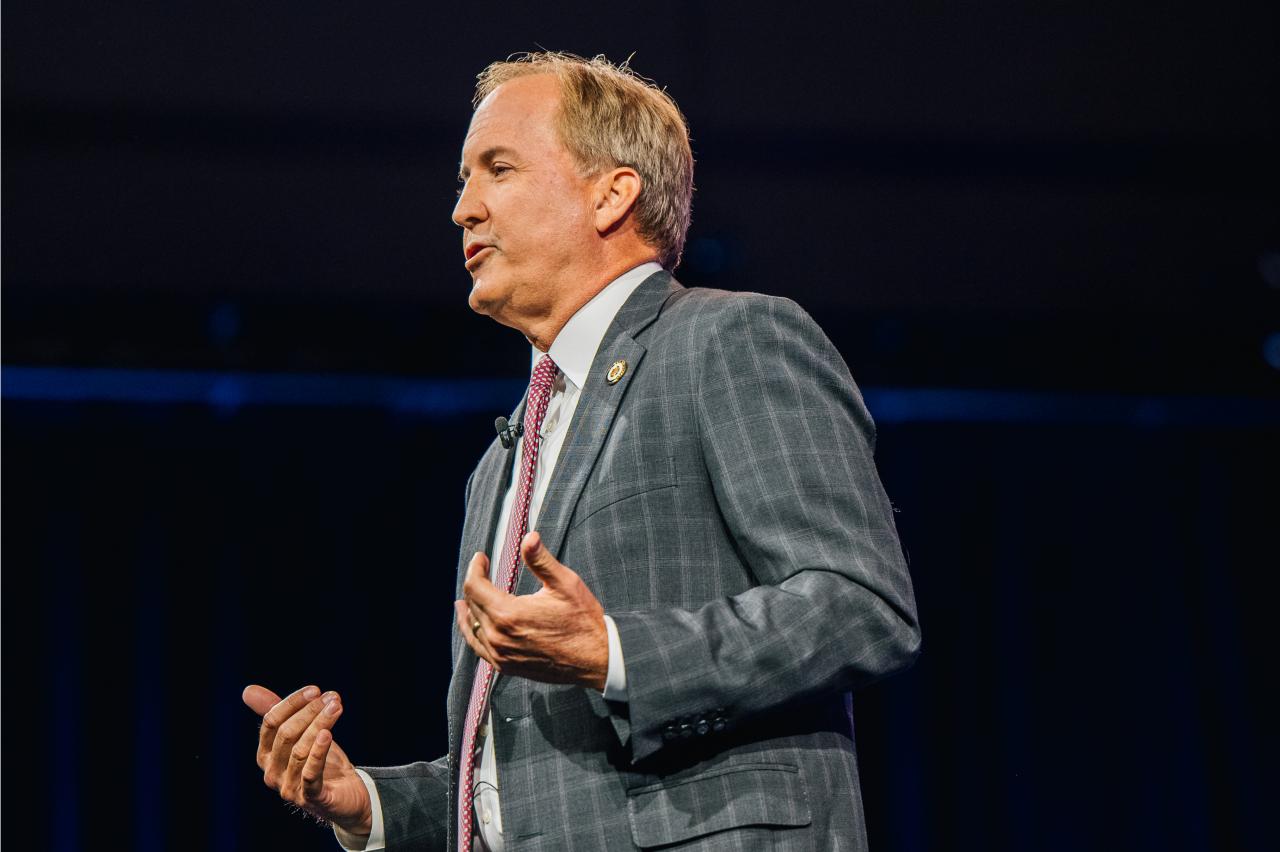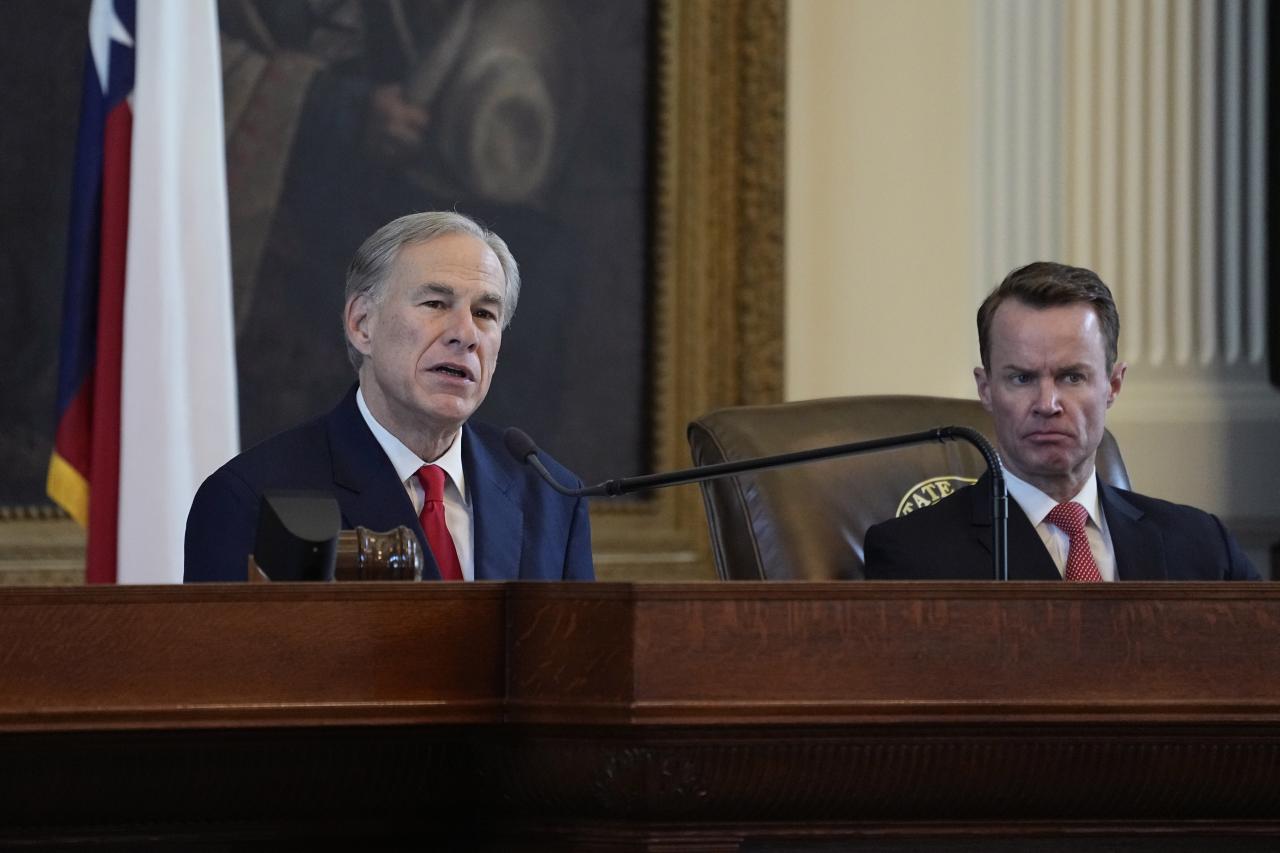BEAUMONT, Texas — Forget the anti-climactic finale of the presidential primary, the most revealing Super Tuesday campaigns are taking place in Texas — and none more than in this swamp-and-refinery filled corner of the state, where the House speaker is at risk of falling victim to Washington-style political tribalism.
Speaker Dade Phelan, the scion of an old Beaumont family, is facing a well-funded primary challenge driven by his two chief antagonists in Austin, Lt. Gov Dan Patrick and Attorney General Ken Paxton, and blessed by their ally, former President Donald Trump, whose seal of good MAGA housekeeping now adorns the signs of Phelan’s chief rival.
Elsewhere in Texas, Gov. Greg Abbott is targeting sitting state representatives who’ve not been fully supportive of his agenda, a purge that has some overlap with incumbents Patrick and Paxton are working to unseat. Abbott wants to elect more pliant lawmakers who will help him pass one of the few conservative wish-list items Texas has yet to approve, school vouchers. Patrick is animated by his desire to consolidate control of the legislative branch of state government, where the lieutenant governor’s office is unusually powerful in Texas, while Paxton is fueled by vengeance against those lawmakers who voted last year to impeach him over corruption and bribery allegations.
At first blush, the Republican-on-Republican violence can feel a bit like the Lone Star version of a Quentin Tarantino picture, with bullets spraying around and the viewer needing a dramatis personae to keep track of it all.
Yet the internecine clash in America’s largest red state, an anchor of Republicanism, is both instructive and, eventually, could prove perilous to the GOP. It’s the end result of Texas’ decadeslong partisan realignment, the subsequent collapse of competitive general elections and, most significantly, an illustration of how the malignant tribalism shaping national politics is metastasizing to state capitals.
There are a handful of modest issue differences, but the intraparty divide is shaped far more by the struggle for power in a state where Democrats are uncompetitive and elections are determined in the March primary not the November general election. The warring is less on the ideological grounds that once divided, and helped doom, Texas Democrats than over process and specifically what’s still acceptable at a moment of total-war politics.
Phelan’s chief vulnerabilities are telling. His Republican rival, David Covey, is attacking him because the speaker continued the longstanding Texas practice of handing some committee chairs to the minority party and because Phelan impeached Paxton.
Such practices — minor concessions to the opposition and policing a rogue state official who’s already facing securities fraud charges — would have hardly been controversial in an earlier statehouse era.
For voters today, and primary voters in particular, their frame of reference is entirely Washington politics, however. Voluntarily handing power to the other side and pursuing accountability in your own tribe? Well, that’s simply not done and it’s downright confounding to the polarized electorate.
“He might be guilty but he’s our guy,” is how Phelan, 48, recalled some of his voters discussing the Paxton case.
Sitting in his downtown Beaumont office and surrounded by an old can of Phelan coffee, a miniature alligator and pictures of his sons draped in the University of Texas’ burnt orange, the speaker acknowledged that the rules of politics had effectively changed under his feet since his 2014 election to the legislature.
“They got Hunter Biden doing these terrible things, well, why can’t our guy do terrible things,” Phelan continued, echoing some of Paxton’s voters. “He sues Biden, we like that, he’s our guy.”
Doing nothing to hide his frustration, the speaker said Republicans were tempting the same fate that befell Texas Democrats after their own internal wars.
“It certainly opens the door,” he said. “Why not? Voters are smart. They want results, and if we can’t produce results because we eat each other up, absolutely it’s going to be a problem.”
At some point, Phelan added, “There will be an opening.”
It’s not likely in the immediate future. The Democratic dream of turning Texas blue, fueled by the shifting politics of the state’s metropolitan centers and increasing ethnic diversity, has foundered against an even more powerful force: education polarization. Working-class voters across racial lines have drifted toward the GOP, making South Texas more competitive and complicating the political arithmetic for Democrats to win statewide.
“I hope I’m wrong but I’m fearful it’s out of reach for a few more years,” said Ben Barnes, a Democratic lobbyist and onetime wunderkind House speaker and lieutenant governor in the LBJ-John Connally era. Barnes pointed to Jim Wells County of LBJ lore, once a Democratic stronghold but which Trump won by 10 percent in 2020.
Still, he was astonished by the brazenness of today’s Texas GOP, noting that Patrick took $3 million from a pro-Paxton group shortly before the lieutenant governor presided over the Senate trial acquitting the attorney general.
“They would’ve marched on the capitol and impeached me if I had taken $3 million like that,” Barnes exclaimed. “But anybody can do anything now as long as it’s Republican and as long as it’s Trump.”
It’s hard to separate the former president from the turn of events in Texas, or any state. Trump has detonated the old establishment-versus-conservative construct, elevated personal loyalty above any policy litmus tests and infused all levels of government with Manichean politics.
“Texas is not immune from this national moment,” said Dave Carney, Abbott’s principal political adviser and longtime GOP strategist. “People don’t wear jerseys anymore, they tattoo their bodies with team colors.”
Driving to meet Covey, Phelan’s chief GOP opponent, I was reminded of the unique nature of Southeast Texas, which is really a hybrid of Texas and Louisiana. The Texas flags are as ubiquitous as in every part of the state, but the BBQ joints have their own unique beef links, serve jambalaya on the side and it’s easy to see crawfish on offer as a Lent special.
Covey, though, is betting that the politics of this onetime home of conservative Democratic House legend Jack Brooks have become thoroughly nationalized, even more so than when Brooks’ 1994 loss signaled his party’s demise here. The MAGA red stripe atop Covey’s billboard reads: “Defend Texas, Save America” and the 4×8 sign on the chain link fence in front of the early voting site where I met him has the same red with “TRUMP ENDORSES COVEY” next to the image of a familiar fellow wearing a red tie and flashing a thumbs up.
Smiling the moment I brought up Trump’s endorsement, Covey recalled how the former president called him with no warning.
“He told me to go kick this guy out of office in very colorful language,” Covey said. “And so, he said Dade’s not representing the district … He wants someone who’s going to be an America First candidate and Dade Phelan has not been a Trump guy or an America First candidate.”
Trump, Covey said, “is really the gold standard in Southeast Texas.”
The former president has endorsed a series of Republicans challenging GOP lawmakers in Texas. He doesn’t know them, incumbents or challengers, of course. But Trump is close to Paxton and Patrick and is happy to help them, an adviser to the former president told me, particularly Paxton who was perhaps the leading state official in Trump’s effort to overturn the 2020 election.
Not surprisingly, two of the three issue priorities Covey cited to me were also those of Trump — the border and “election integrity.” The third was school vouchers, Abbott’s focus.
Abbott has not taken sides in Phelan’s race, which Covey said “tells you all you need to know.”
The race here could go to a May runoff because there’s a third candidate competing, who could take enough votes to deny either of the top two contenders from reaching a majority on Tuesday.
Where Covey agrees with his rival, though, is that all the in-fighting could ultimately help Democrats. “I think that Dade’s mushy Republicanism is really what could weaken our hold on Texas,” he said of Phelan.
The speaker is baffled at the claim of being less than a full-throated conservative, particularly given the legislation loosening gun rules and restricting abortion rights he’s pushed through the House. Texas has had moderate legislative leaders — former House Speaker Joe Straus comes to mind — but Phelan is hardly a centrist.
Equally perplexed is former Gov. Rick Perry — you hadn’t forgotten him, had you? — who has come off the sidelines for a number of legislative races, none more enthusiastically than that of Phelan.
“Dade Phelan is no more a RINO than Rick Perry,” the former governor said last month at a Beaumont-area rally, before embracing the term. “I think it’s kind of sexy, frankly,” Perry said, explaining that the rhinoceros is “one of the baddest boys on the block, right?”
In private, Perry is less amused, I’m told, asking former legislative allies what in the world has happened to the Texas GOP in the decade since he left office.
Sen. John Cornyn (R-Texas) is also dismayed and of late has been engaged in an extraordinary X, formerly Twitter, war with Paxton, who is eager to challenge (or succeed) Cornyn in 2026: “Hard to run from prison, Ken,” Cornyn said last week.
“I am concerned about it,” Cornyn told me about the wars between Austin powers. “We’re obviously divided, looks like a little bit of Washington infected Austin.”
What’s most sobering is the menace of political violence has also drifted down from the nation’s capital. Phelan told me he has to have Texas Department of Public Safety officers out in front of his house in Beaumont and one constituent is currently in the county jail awaiting a trial for threatening to kill the speaker.
Walking out of his office, Phelan, who worked for former Rep. Dick Armey (R-Texas) in Washington, said his critics were akin to the “Matt Gaetzes of the world,” alluding to the Florida GOP representative who led the push to oust then-U.S. House Speaker Kevin McCarthy last year.
“It’s a handful of folks who don’t have much power but they can shut things down on any given day and that’s where they’re going to try to do because that’s the model,” he said.
But, Phelan added, “it hasn’t worked well in Washington, D.C. the last time I checked.”
Ben Johansen contributed to this report.
 RSS Feed
RSS Feed















 March 5th, 2024
March 5th, 2024  Awake Goy
Awake Goy 

 Posted in
Posted in  Tags:
Tags: 













